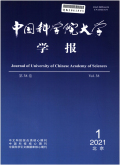中国科学院大学学报2024,Vol.41Issue(3):345-356,12.DOI:10.7523/j.ucas.2022.081
一类变系数空间滞后的混合地理加权回归模型
A mixed geographically weighted regression model with varying-coefficient spatial lag
摘要
Abstract
Spatial correlation and spatial heterogeneity are the theoretical basis of spatial econometrics.In order to solve the local problem of spatial lag of dependent variables,this study extended the existing mixed geographically weighted regression model with constant-coefficient spatial lag,and proposed a mixed geographically weighted regression model with varying-coefficient spatial lag.The mixed geographically weighted regression model with varying-coefficient spatial lag combines spatial correlation with spatial heterogeneity,and covers most of the model forms of geographically weighted regression.Based on the parameterization reconstruction method and likelihood ratio test,the coefficient estimation method,significance test of this model and the discriminant test of varying-coefficient are given respectively.Both in Monte Carlo simulation and practical application,the results show that the mixed geographically weighted regression model with varying-coefficient spatial lag renders itself well for the fitting and forecasting effect on dependent variable.The mixed geographically weighted regression model with varying-coefficient spatial lag provides a support for setting up a suitable model form for quantitative research on spatial effects.关键词
空间异质性/混合地理加权回归/显著性检验/变系数Key words
spatial heterogeneity/mixed geographically weighted regression/significance test/varying-coefficient分类
数理科学引用本文复制引用
唐志鹏,吴颖,熊世峰,黄寰..一类变系数空间滞后的混合地理加权回归模型[J].中国科学院大学学报,2024,41(3):345-356,12.基金项目
国家自然科学基金(42171177,12171462)、成都市政府系统重大课题(B35360110202100097)和成都理工大学社科规划重大培育项目(YJ2021-XP001)资助 (42171177,12171462)

